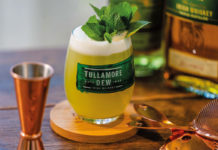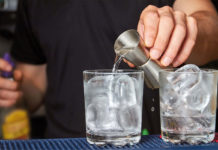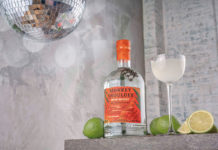
ECONOMIC and political uncertainty was one of the central topics discussed at the launch of the latest William Grant & Sons Market Report.
The publication, compiled by the Scottish drinks firm, owner of Glenfiddich, The Balvenie and Hendrick’s, every year, found consumption habits across the country had been affected by uncertainties over the economy and the political climate. However, consumers continue to spend money in the on-trade, with sales of spirits topping £6 billion in Britain’s pubs and bars (compared to £4bn in the off-trade), up 3.1% in the past year.
Growth in spirits sales was largely attributed to the gin category, which grew by £86 million to a value of £650m.
Bars and clubs were said to be the biggest sector of the on-trade for spirits sales, with £2.9bn of spirits sold in these venues across the UK, with pubs accounting for £1.6bn in sales and hotels and restaurants £1.3bn. Pubs had seen the biggest growth in spirits sales, having added £78m, with hotels and restaurants adding £56m and bars and clubs selling an additional £44m.
However, the report stated that 711 drinks-led pubs had shut their doors in the past year, as well as 385 ‘circuit bars’ and 330 café bars.
A trend towards premium drinks continued, with premium spirits seeing an 8.7% increase in sales to a value of £862m and the overall value of spirits sales growing ahead of volumes (value grew 3.1%, compared to a volume increase of just 0.3%).
Similarly, the report highlighted the importance of premium outlets, which were said to be driving value across the country.
This was reinforced by the statistic that 72% of bars are now serving cocktails – more than any other type of outlet in the on-trade.
Bars and clubs were the biggest sector of the trade for spirits sales.
Cocktails were also said to be more prevalent in pubs, hotels and restaurants, however, with “over one in three” pubs now serving them, as well as 41% of hotels and 31% of restaurants.
Food-led pubs, meanwhile, were said to be the fastest-growing section of the on-trade, with these outlets having increased value sales by £39.7m in the space of a year.
Restaurants were the second fastest-growing, having added £38.2m of sales to the market in the course of the year.
Blended whisky, gin, imported whiskey and malt whisky were said to over-index in pubs compared to other types of outlet, with vodka, speciality spirits and non-cream liqueurs accounting for more than half of bar and club sales and vodka, gin and non-cream liqueurs taking 55% of spirits sales in hotels and restaurants.
“Consumer behaviour and habits have continued to evolve in this time of uncertainty, but still there remains an element of consistency with the trends identified in our previous reports, as the consumer trends and resulting behaviours have adapted to this new normal,” said Gary Keogh, marketing director at William Grant & Sons UK.
“More than ever, brands need to have a point of view, share their values, and reach heightening expectations to meet consumer needs.
“The brands that succeed will be those that can balance these often conflicting needs and offer inclusive, collective experiences, a playful sense of purpose, and meet on-demand consumer expectations without compromising on quality.”
Rita Greenwood, managing director of William Grant & Sons UK and Ireland, said the report showed “that it is more essential, now than ever before, for businesses and brands to adapt if they are to remain relevant with today’s consumers”.
The biggest-selling spirits brands in the British on-trade by value were: Smirnoff Red Label; Jägermeister; Jack Daniel’s Tennessee Whiskey; Gordon’s London Dry; Captain Morgan’s Original Spiced Gold; Bacardi Carta Blanca; The Famous Grouse; Courvoisier VS; Bell’s Original; and Absolut Original.
Non-flavoured vodka remains the biggest spirits category in the British on-trade, followed by non-cream liqueurs, gin, American whiskey and then blended Scotch.























